TOGETHER
With you, we make a difference

Lighting a path for the next generation of researchers
International collaboration demonstrates powerful difference in PNG
Djaalinj Waakinj Centre – listening to child health concerns within Aboriginal communities
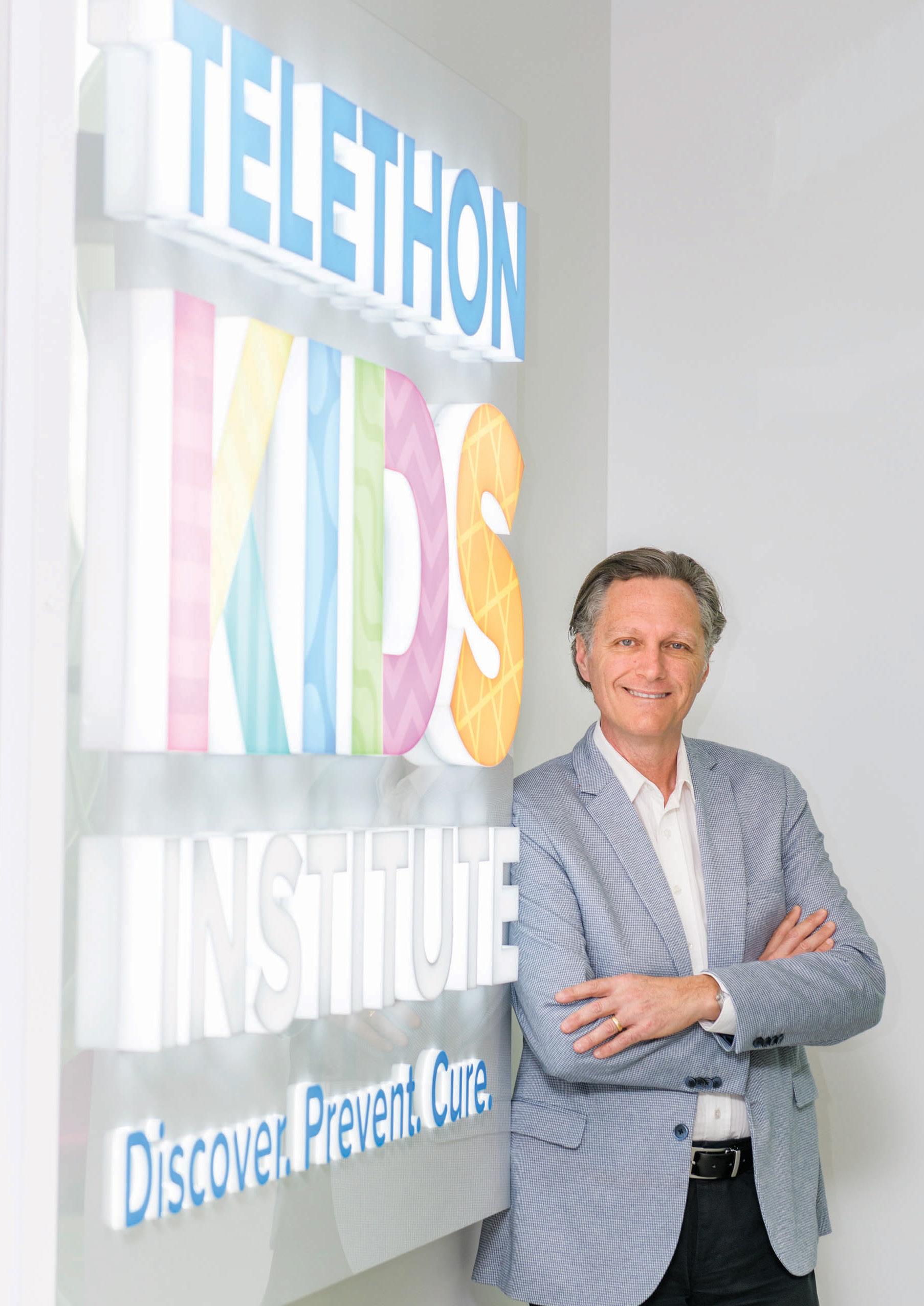
DIRECTOR
Our community is one of Telethon Kids’ greatest strengths and helps drive our ability to make a difference.
At Telethon Kids Institute, our vision may be simple – happy, healthy kids – but this is no small task. We are on a quest to improve kids’ lives through research, and it would not be possible without the ongoing support of our dedicated community.
There is no doubt it has been a challenging time for Western Australia as we continue to tackle COVID-19 in our community. With leading experts, researchers, and scientists focused on the task we have been working to understand how the virus affects the health and wellbeing of our kids and families, and how we can adjust to the fact that COVID-19 is now part of all our lives.
Throughout, we have remained committed to working together to connect and protect community during these unprecedented times.
Our research and work within remote and regional communities continues. Adapting to the additional challenges, research teams have adjusted in an everchanging environment to ensure our lifechanging impact is felt in areas where it is needed most.
Within these pages of Together you will find research updates, announcements of exciting new beginnings, reflections from one of our founding members and stories of hope. They articulate the rapid progress in child health research - it is an exciting time!
It goes without saying that we are deeply grateful for all kinds of giving that allows Telethon Kids Institute to continue to grow as we discover, prevent and cure childhood diseases and disorders.
Whether it be a gift in your will, a gift that is directed to a specific area that interests you personally, or an unconditional gift – you are making life-changing research possible.
Our Institute’s relationship with the community is unique. This has translated not only in people supporting us through generous contributions but through participation and interest in our research.
Our giving community at Telethon Kids Institute recently received an email from us with a supporter survey about how we can stay better connected. I encourage you to fill it out and share your feedback with us – we are always excited to hear from you. If you’d like to learn more about this survey, please contact our Development team at giving@telethonkids.org.au
With you behind us, the life-changing potential for helping every child is unlimited.
 Professor Jonathan Carapetis AM Executive Director
Professor Jonathan Carapetis AM Executive Director
If you didn’t receive a copy of our Supporter Survey and would be interested to share your thoughts, we would love to hear from you! Please email giving@telethonkids.org.au and we can arrange one to be sent.
3
MESSAGE FROM OUR
3
SHINING A LIGHT ON OUR
Best & Brightest

At Telethon Kids our greatest asset is our people. We are strongly invested in the future of child medical research by welcoming, nurturing, and encouraging the best and most innovative Australian and international researchers.
However, our best and brightest researchers face an increasingly competitive environment spending more than a third of their time preparing grant applications and securing research funding. This means substantial delays in research and even career insecurity, particularly for early and mid-career researchers.
PhD Candidate Niamh Troy
Niamh Troy has recently completed her PhD at the Wal-yan Respiratory Centre, Telethon Kids Institute and the University of Western Australia. Niamh’s PhD research provides strong rationale for how we can harness babies’ innate immune systems using bacterial medications to protect against lung infections and potentially prevent asthma.

Dr Gina Trapp
Dr Gina Trapp is the Head of Food and Nutrition – driven to leading her team in becoming a hub of child and adolescent nutrition research globally, while also being a valuable collaborator to other researchers, governments, organisations, and service providers.

Her research uses cutting-edge bioinformatics to better understand the immune response to respiratory viral infections – and her awarded funds will inspire new big ideas for the next step.
Gina has over 18 years of research experience and has worked across a wide range of projects spanning the obesity prevention areas of nutrition, physical activity and built environments.

To ensure we retain and best support WA’s brightest minds, the
"All my skills are around understanding the immune system in chronic disease, so that's the launchpad I'm going to try and jump from."
Niamh Troy
Dr Samantha Carlson

Lighting a path for the next generation of researchers, these awards connect our community of supporters directly with award recipients providing a unique personalised insight into child health research at Telethon Kids.
Last year, the Institute’s Development Advisory Network, a volunteer committee who support strategic fundraising activity, hosted the inaugural Illuminate Dinner in support of the awards vision.
The evening was a huge success with in-kind support from suppliers and community. Through the generosity of guests on the night, four Illuminate Awards have been established to provide salary security and discretionary research funding for WA’s best child health researchers at Telethon Kids.
Each with a uniquely passionate drive, the four Illuminate recipients are now able to focus on the research – discovering, preventing and curing childhood diseases and illnesses.

Dr Samantha Carlson is an early career mixedmethods social scientist, leading research that seeks to understand how to improve access to and understanding about vaccination.

With the support from the Illuminate Award, Samantha will be enabling support of an Aboriginal Research Assistant in her team who works closely with the Aboriginal community, as well as health care workers and organisations, to find solutions to increase vaccine uptake together in a culturally appropriate and codesigned way.
"It's a big gap and I'm honoured to be working alongside the Aboriginal community, researchers and health care workers to learn about what's needed to protect kids from infectious diseases here in Perth."
Dr Samantha Carlson
If hearing this story has resonated with you and you’re interested in being involved in keeping our brightest and best leading the future of child health research, please get in touch with Patrice Maher on 08 6319 1102, or email patrice.maher@telethonkids.org.au
"To grow myself and my team's capacity and program of research, over the next 5 years I will maintain a highly competitive track record for securing nationally competitive funding, build capacity by training postgraduate/postdoctoral researchers and further develop strong (inter) national collaborations,"
Dr Gina Trapp
Dr Hannah Moore

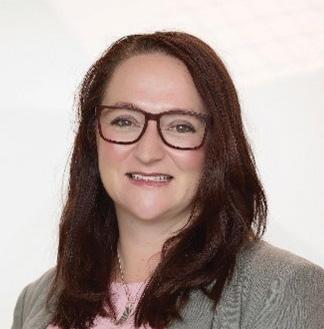
Dr Hannah Moore is Program Head, Infections and Vaccines and CoHead of the Infectious Disease Epidemiology team within the Wesfarmers Centre of Vaccines and Infectious Diseases. Her research passion lies in unlocking the hidden power of routinely collected data through linkages and epidemiological analyses, and then seeing the results both improve the knowledge and burden of infectious diseases and translate into better informed vaccination programs for society.
Hannah's Illuminate Award funding will help her to achieve her research goals to accelerate progress and expedite vaccine policy.
"Awards like this give me the opportunity to now employ a project support officer or help supplement salaries, such as our new mathematical modeller to look at some of the big research questions around the respiratory syncytial virus. These funds will really help progress the research and actually get it done."
Dr Hannah Moore
4 5 4
FOR RESEARCH MAKING A SPLASH
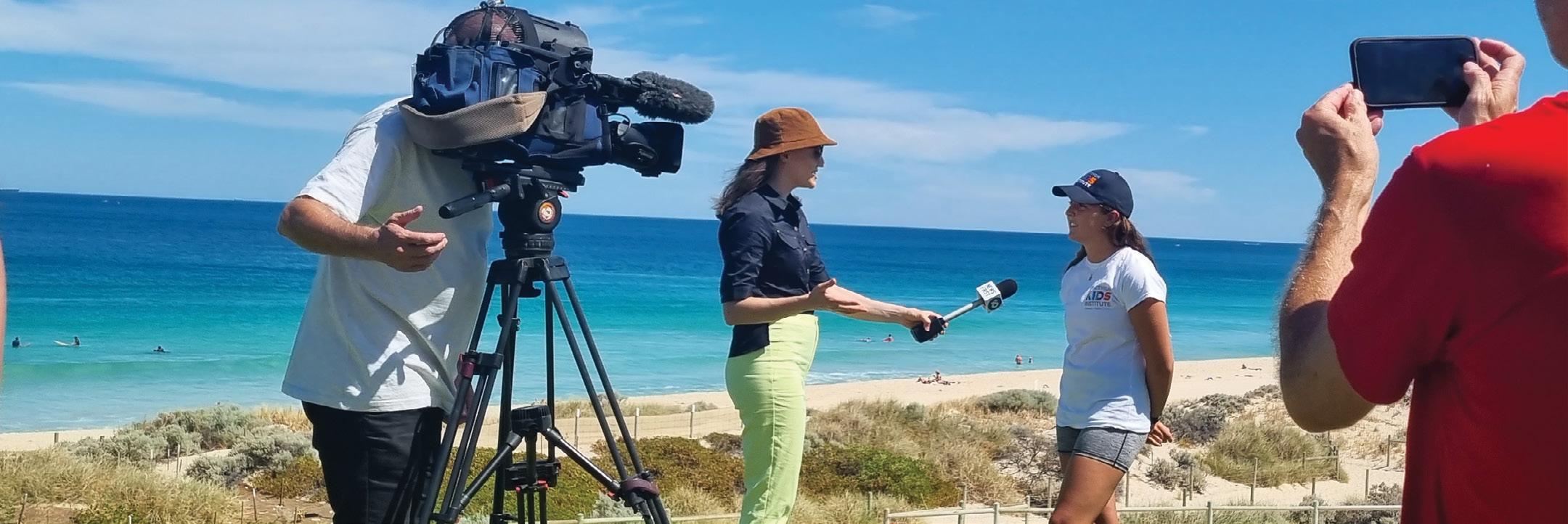
After watching a loved one slowly lose his battle to cancer at the age of six and faced with her own health battles, Darcey Brooks’ interest to make a difference in child health research was sparked at a young age.
It was this interest that led her to the Institute where she kept tabs on the latest news, exciting research, and opportunities to be connected. In February 2021 she was diagnosed with a bone infection, spending days in hospital for treatment and management. It was during this time, bound to a bed and with the tide turning, Darcey set herself an amazing goal of completing the Rottnest Channel Swim solo within the year.
Using the swim as motivation, her determination to make a difference grew stronger as she became more familiar with the Telethon Kids Institute Cancer Centre. She decided to turn the swim into a fundraising opportunity as a humbling way of supporting future research –providing hope and new opportunities for kids battling cancer, something all too familiar for Darcey.
As part of her fundraising efforts, Darcey organised t-shirts sales and a movie night in the
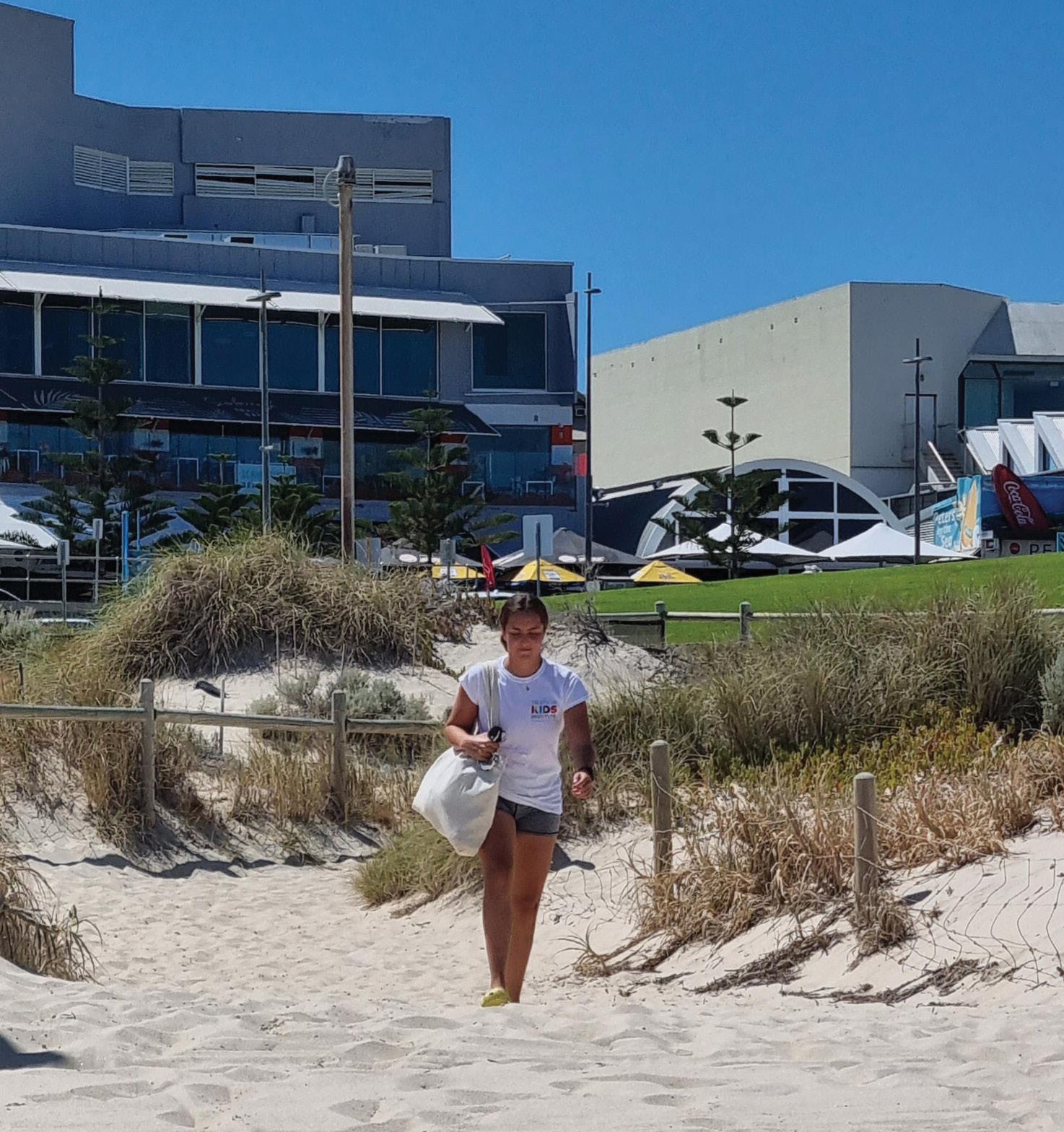

northern suburbs with family, friends, and her community out in force to support their local legend.
Prior to the swim Darcey was already on her way to achieve her fundraising goal of $5,000, although she was then hit with another health hurdle.
Only weeks before the event, Darcey was involved in a car accident requiring numerous health checks, scans, and hours of physio. Despite the pre-event preparations not going as swimmingly as she planned, she used the same mentality she would need on the day of the swim – determination.
Capturing the attention of the state with an exclusive TV interview, Darcey went on to complete the 19.7km endurance swim solo, finishing within the top 20 female competitors. She selflessly swam to a fantastic fundraising result of $6,211, proudly flying the flag for Telethon Kids Institute and cancer research.
What an achievementthank you Darcey!
Darcey is one of our fundraisers who is making a difference because she believes in our vision.
If you are inspired by Darcey’s story and interested to learn more about how you can support the Institute through your own fundraising efforts, please get in touch with Katie Burrage on 08 6319 1171 or katie.burrage@telethonkids.org.au
TECHNOLOGY LEADING THE WAY FOR DIABETES MANAGEMENT
From the age of two, when Drina Bucktin was diagnosed with type 1 diabetes (T1D) it has been years of multiple daily needles, finger pricks, late nights and constant diabetes talk for her and her family.
Both Drina and mum Heidi described living with T1D – a chronic disease, where the pancreas stops the body making insulin – as exhausting, unrelenting and stressful.
But new technology is taking the burden away and improving Drina’s quality of life, letting the teenager focus on what she loves most – sailing, rowing and running.
Nine months ago, when Drina (15) was invited to participate in a diabetes technology study for children and adolescents who are struggling with diabetes care on pump therapy, her and her mum didn’t need to give it a lot of thought.
“Drina’s blood glucose levels were not well controlled, and I was becoming the diabetes police”, Heidi Bucktin said. “We needed to change things up so we could go back to a mother-daughter relationship and not just talk about diabetes.”
“When the system is working, insulin delivery is automated with more or less insulin delivered according to sensor glucose levels,” Dr Abraham said. “By doing that, it takes some of the burden away from the person with diabetes, and their family.”
“This trial is focusing on children and adolescents with T1D who are struggling with diabetes care with their current pump therapy –a cohort most at risk of immediate and long-term diabetes-related complications.”
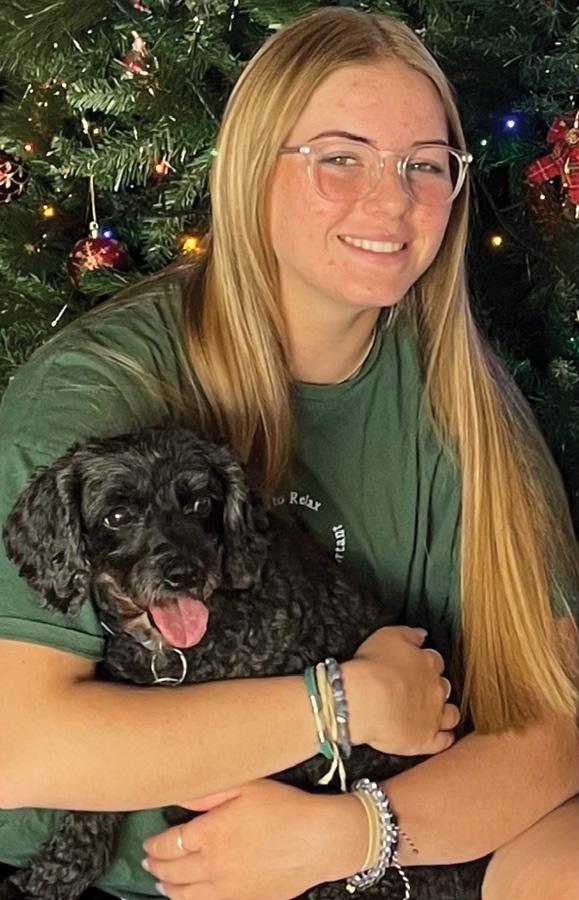
We expect the system to be better than current therapy at bringing glucose levels within the normal range.
Drina said the study had been great for her with the autonomy of the system taking a bit of worry and struggle out of every day.
“Before this study, my blood glucose levels were consistently in the high range, but now more often than not they sit in the normal range taking a lot of the stress away.”
Led by Dr Mary Abraham and Professor Tim Jones from the Telethon Kids Institute Children’s Diabetes Centre, the Australia-wide study is trialling an advanced hybrid closed-loop (HCL) system which has further potential to improve diabetes management.
The HCL system – a device that is a step towards an artificial pancreas – consists of an insulin pump, a sensor with transmitter and a maths program (an algorithm) within the pump that automatically works out how much insulin is needed.
DID YOU KNOW?
“I still have to manage my diabetes, but the system has given me some control back in my life, more flexibility and a lot more confidence at night-time and during sport.”
Dr Abraham said the next stage with all technology was further improvements and iterations to continue to make the system better.
“Ultimately we want to have a system we give to people that manages their diabetes automatically without them having to put as much effort into it.”
► T1D diabetes is a chronic autoimmune disease that results from the immune system attacking the insulinproducing cells of the pancreas
► Currently, T1D cannot be prevented but it can be managed by administering insulin, monitoring glucose levels, having a healthy, balanced diet, and getting regular physical activity
► In WA, about 160 children are diagnosed with diabetes every year
What’s Next?
► This Australia-wide trial will continue until the end of the year with another 6-month optional phase for participants to use the HCL system.
► The team have also commenced recruitment for another study using this advanced hybrid closed-loop system for young children aged 2-7 years.
7
6
DarceyBrooks
7
FOUNDERS SERIES
Steve Zubrick
Professor Steve Zubrick is so well respected at Telethon Kids Institute that he has a room named after him. The Zubrick Room honours Steve for being a luminary in his field and an inspiration for all staff and students. It’s a reflection of a stellar career where for more than 30 years, Steve has been instrumental in designing, implementing and leading Australian studies of child and adolescent mental health.
Not only has Steve led ground-breaking research studies, he’s had the ear of policy makers and is an advocate for kids everywhere, helping to shine a spotlight on some of the issues not usually talked about, including mental health in children and young kids.
As a founding member of Telethon Kids Institute, his dedication to his work and wealth of experience has rewarded him with a humbling career, that has led to many deserving awards and accolades.
His first project set the scene for his career at the Institute with an ambitious plan in 1991 to survey Western Australian families about the mental health of children and their family and school circumstances.

In a unique partnership with Healthway and the Government – Department’s of Health, Education, and Community Services - the WA Child Health Survey was born. Steve and his team contracted services from the Australian Bureau of Statistics to conduct this survey.
For the first time in Australian history, a randomised sample of 1,400 WA families with kids between the ages of 4-17 were surveyed throughout WA, with results published over a period of six years.
Families and young people were asked a series of very sensitive questions about their mental health, wellbeing, living circumstance and finance among other things, it was a remarkable achievement for Steve and his team with an 85% participation rate.
Parental consent was obtained for interviewers to interview the teachers and principals of the survey children who were attending schools.
Attracting national and international attention, researchers and academics were drawn to Perth due to the extensive database availability and impressive work like Steve’s being conducted at the Institute.
A world expert in early language development and the gene environment – Professor Mabel Rice from the University of Kansas - specifically scoped out Steve, Cate Taylor, and the team at Telethon Kids for a population study on language development in twins.
They were awarded an initial $6 million grant from the US National Institutes for Health and went on to receive 15 years of continual funding.
“That was a lot of money for a research project in the early 2000’s, and it created quite the commotion and responsibility.”
Vehicles equipped with clinical language assessment facilities were driven all over the state for 15 years as the kids grew up. The Looking at Language Study analysed the interplay between genes and the genetic components that drive, create, and regulate the speed language develops within children.
Steve trained in the United States at the University of Michigan and holds qualifications in clinical and neuropsychology as well as speech pathology and audiology.
While completing his postgraduate work at the University of Michigan, Steve met his wife to be –Ann, fell in love and followed her back to Perth where they have made their home ever since.
It was after moving to Perth and while working at the WA Department of Health, within the area of mental health, that Steve first met Fiona Stanley when she approached him about conducting a study on the outcomes of neonatal intensive care.
Within 12 months of that conversation, Steve spurred the enthusiasm of a Masters student and together they developed a paper on the topic.
It was 1980, and this was the start of Steve’s exciting career in Western Australia, influenced by Fiona.
Nine years later, Fiona approached Steve again but this time it was to share her vision of a centre for child health research.
“I had no idea what I was getting myself into.
“Fiona and I worked very well together.”
Along with a fellow colleague, Sven Silburn, Steve and Sven took the opportunity to be seconded from Department of Health into the new West Australian Research Institute for Child Health (now Telethon Kids Institute).
From the Department of Health, Steve moved his office to the Institute’s building on Roberts Road where 60 people gradually came together to form WA’s first child health institute. Steve’s role was simple, yet ambitious - to create a research focus on psychosocial wellbeing and mental health.
“At that point in my career, I had never written a grant”, he chuckles.
“We all accepted that if we were going to be there, then we would have to bring our own money to do our work.
“There was a terrific amount of excitement and energy as the founders established their research. It unfolded very rapidly!”
The outcome highlighted a very alarming reality that was being felt across the country at the time. By 1997, Australia hit a grim peak of suicide and suicidal behaviour in teenagers that was indicated within Steve’s research right from the beginning.
Revolutionising the way we saw mental health in kids, Steve’s team published the very first community prevalence estimates of significant paediatric mental health problems in Australia.
“The survey gave us a completely new look at mental health in Australia and it was very empowering to the health, mental health and education services,” explains Steve.
It resulted in a promise to undertake the same quality of work among Indigenous families. Steve’s team went on to run the WA Aboriginal Child Health Survey which was, and still is, the most comprehensive survey ever undertaken on the health and wellbeing of Aboriginal children and families.
“Children are children. The needs of all children are fundamentally the same - to be loved, to be cared for, to be supported, to be protected, to be believed in… regardless of colour, size, shape, or what place you live in. Beyond that there are cultural differences that absolutely must be respected but, children are children.”
In a similar fashion to his previous work, external interest grew and attracted the Australian Government to construct the first national study of child development of Australian children, known as the Longitudinal Study of Australian Children (LSAC).
A small group of researchers and professors from around the country came together, formed a consortium, and applied for the tender. Steve went on to chair the consortium for 18 years. He even starred in the ABC documentary “The Life Series: Life at 1, 3, 5, 7, 9” which was made in conjunction with LSAC and followed children from different walks of life to see what it takes to give a child the best chance at life.
LSAC is still going today and has just been awarded another $30 million to continue following the 10,000 young people into their mid-20’s.
“Children of LSAC are now having children of their own!”
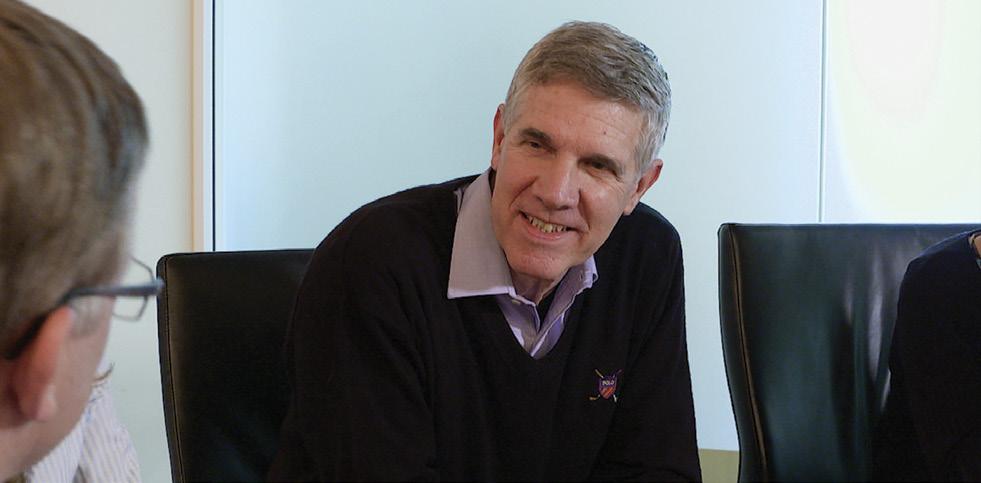
8 9
8
From a cohort of 60 staff, Telethon Kids has now grown into a bursting hive of activity of more than 1000 researchers, academics, professors, and professionals – something Steve said he never could have imagined.
“I had no notion that something we started back then would still be as successful as it is today, 30 years later, nor how rewarding my career would be in child health research, taking me around the world.”
Steve’s humble beginning in child health research, continues to inspire him today, through the scale research is being conducted and the scale it is supported.
“The grant funding landscape has changed during my time as a researcher and no longer sufficiently supports the full cost of research.
“An early to mid-career researcher now must juggle more than just a career in research – they have to constantly focus on finding the next source of funding while trying to conduct the research and still make a living.
“The risk is that by distracting our researchers with funding insecurity – it distracts them from finding the brilliance in the work they are doing.
Today, philanthropy is increasingly completing the process – making the difference between good research and the best research!”
There is no doubt throughout his career at Telethon Kids, Steve Zubrick truly achieved his best!
“It’s been an exceptional life changing force for not just the people who benefit from the Institute but for the people who grow there as well.”

PARTNERSHIP Purpose WITH 11
Members of the Telethon Kids Institute Development team recently joined the Kulunga Kimberley team in Broome for an exciting announcement. We are delighted to welcome a new partnership with INPEX who are generously supporting research capacity building, employment, and training outcomes in remote communities.

► SToP Skin Study
Aligned in our mission, of happy, healthy kids - our commitment to supporting Aboriginal research and staff means co-designing research in a culturally secure way and translating outcomes into genuine positive change for kids and families.
Telethon Kids Institute’s Kimberley platform is based in Broome and was established to serve as a permanent ongoing research presence in the region.
With the intention to expand the number of local staff based in the region, this partnership will help to kickstart additional opportunities to further engage with the community to support positive impact from the research being conducted and provide a platform for Institute researchers as they undertake their work.
Aboriginal health & wellbeing is everyone’s business, which is why at Telethon Kids, we are up for the challenge influenced by our passionate community. It is because of community participation in our research we are motivated to support happy, healthy kids. A sample of projects in the Kimberley include:
►
Kimberley Aboriginal Health Research Alliance
A collaboration between KAMS, Aboriginal Health Council of Western Australia, WA Country Health Service, Rural Clinical School of Western Australia, University of Notre Dame and Telethon Kids Institute to transform research in the Kimberley into a locally driven, community- led and owned approach.

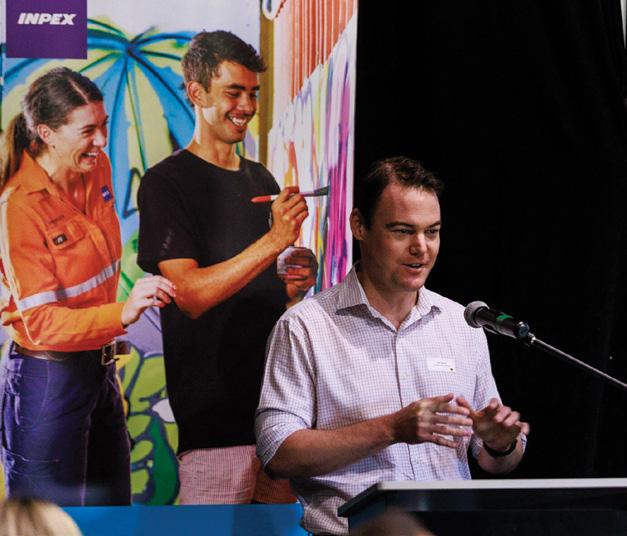
The SToP (See, Treat, Prevent) skin sores and scabies Trial is trialling a holistic skin control program in remote Western Australia which includes prevention research (health promotion and environmental health). This is a very large study spanning four plus years and four community clusters comprising nine communities in total.
► Bushtucker and Vitamin D
In the Kimberley this project involves working with ranger groups to collect and test bushtucker samples for it’s Vitamin D content, combined with community nutrition education and sun exposure awareness raising.
► Aboriginal and Torres Strait Islander Partnerships to Prevent Permanent Lung Disease (APPLE Study)
The BREATH team are working in the East Kimberley to reduce the burden of bronchiectasis by preventing the progression of protracted bacterial bronchitis to bronchiectasis in Aboriginal children. In partnership with Aboriginal health services, government agencies and communities, the team are working to develop and implement evidencebased strategies to improve the detection and management of chronic wet cough in Aboriginal and Torres Strait Islander children. Bridging the gap between evidence and practice will reduce the chronic lung disease burden in Aboriginal and Torres Strait Islander children and prevent the progression of disease into adulthood.
Our commitment to the ongoing work in Aboriginal health is more than a series of actions but a commitment in the very real sense of the word. Without support from our likeminded corporate partners, we would not be able to achieve the same impact within our communities who need it most.
Thanks to INPEX we are excited to see new opportunities coming to light in Broome –watch this space!
10 11
DEDICATED EAR HEALTH SERVICE FOR ABORGINAL FAMILIES
SET TO LAUNCH AT COCKBURN
Telethon Kids Institute is set to become a national leader in Aboriginal ear and hearing health thanks to the launch of our very own service dedicated to helping Aboriginal children.
Driven by the success of the Institute’s research program providing accelerated pathways to treatment for Aboriginal families in the South Metropolitan region, the new Djaalinj Waakinj Centre for Ear and Hearing Health aims to treat 400 children suffering otitis media and hearing loss each year.
The Djaalinj Waakinj Centre is an innovative partnership that brings together Aboriginal community organisations, clinical services and research to change young lives through the early detection and treatment of ear disease. Due to open in a few months’ time, the research component will be led by Valerie Swift, Aboriginal Cultural Governance Advisor at Wesfarmers Centre of Vaccines and Infectious Diseases, and Associate Professor Chris Brennan-Jones, the Institute’s Head of Ear Health and Audiologist at Perth Children’s Hospital.”
The Ear Health team have spent the last eight years exploring the prevalence and risk factors for ear health issues in Aboriginal families, as well as the barriers to equitable service provision. With over 50% of Aboriginal children found to have ear disease requiring intervention and management by six months of age, and the public hospital struggling to cope with demand, it was clear a dedicated service was urgently required for these families.
“Through an initial community consultation process with the local Aboriginal community, we found that many families were concerned that their children weren’t hearing well but were unsure of the extent of the problem and how to access diagnostic and treatment services,” said Mrs Swift.
“Some children are currently waiting over two years to see a specialist, plus up to a year on top of that if surgery is required. During this time, the infections worsen, hearing loss may increase and children can fall far behind their peers in their speech and language development.
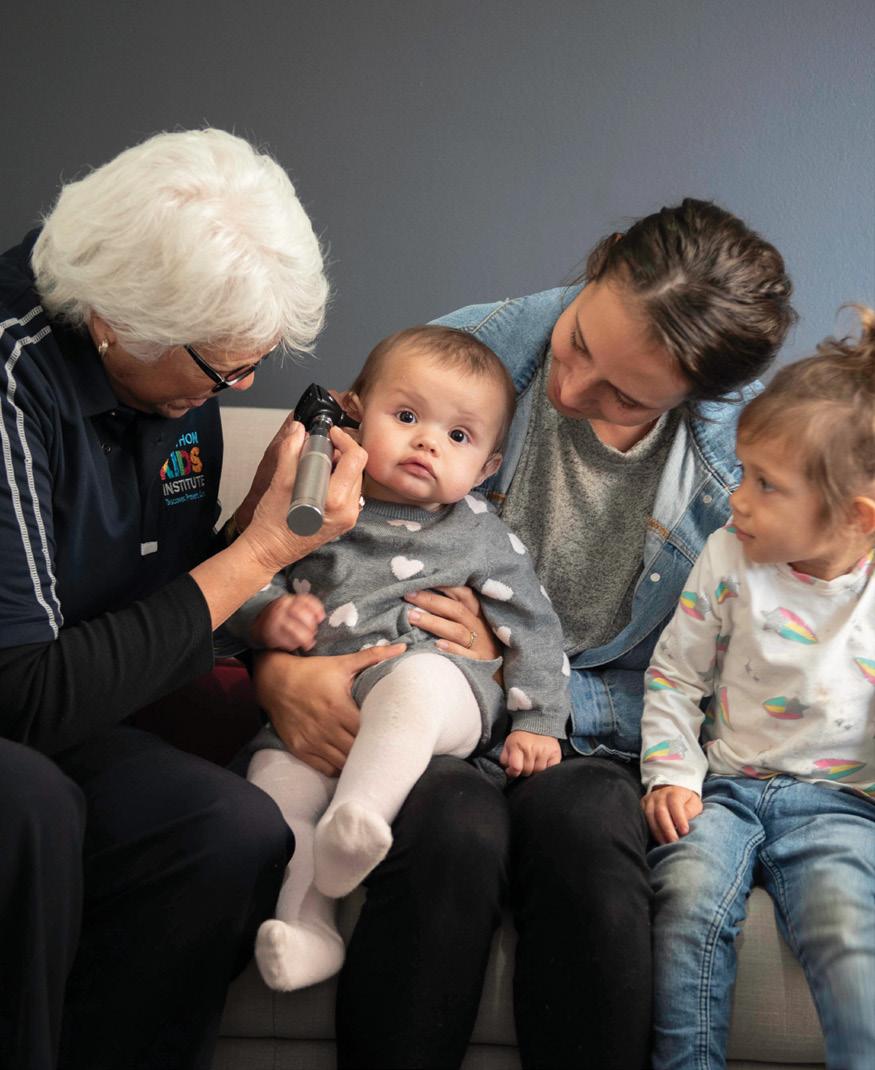
“When kids can’t hear their learning suffers - leading to issues surrounding education, behaviour, social relationships, employment and other future endeavours. This is why early treatment is so vital, and we need to ensure all children can access the right specialist care, in the right place, at the right time.”
According to A/Prof Brennan-Jones, the Djaalinj Waakinj Centre will provide a unique opportunity to provide a dedicated clinical service at the same time as integrating clinical trials and facilitating the translation of novel therapies to effectively treat otitis media.
“In addition to accessing early childhood ear checks at three-to-six monthly intervals, diagnostic hearing assessments and specialist treatment, families will be offered the opportunity to take part in ground-breaking research projects aiming to improve the prevention, diagnosis and treatment of otitis media and hearing loss.
“The new Centre will also build capacity for significant training and development of Aboriginal staff and bring new opportunities for obtaining competitive funding to support future research,” said A/Prof Brennan-Jones.
The establishment of the Djaalinj Waakinj Centre was made possible thanks to support from the Institute’s Aboriginal Community Advisory Group and Cockburn Integrated Health, as well as funding assistance from Austal Shipping. Initially based at the current Cockburn location, it is hoped the service will expand across the East and North metropolitan regions of Perth in the near future.
Djaalinj Waakinj Ear Portal Program is generously supported by Austal. Austal’s partnership enables further employment for local Aboriginal health workers while providing our researchers with greater opportunity to understand the factors behind the prevalence.
PNEUMONIA
HOSPITALISATION
RATES
SLASHED IN 13 NewPapuaGuinea

For the last 25 years, researchers from Telethon Kids Institute and Papua New Guinea Institute of Medical Research (PNG IMR) have been united in the fight against pneumonia - PNG’s major killer of babies and young children.
PNG has historically had one of the highest child death rates in the Western Pacific Region - one out every 15 children did not reach their fifth birthday - and many were dying from pneumonia. Meningitis was another of the top five killers and, for those who do survive, the majority will have ongoing problems like blindness, hearing loss and brain damage. These illnesses are uncommon in Australia thanks to the
power of vaccination, but they continue to be widespread in PNG where children are still dying from vaccine-preventable infections.
When Clinical Associate Professor Deborah Lehmann AO joined the Institute in 1998, she continued her ongoing pneumococcal and pneumonia research from nearly two decades working in PNG. Investigations into the bacteria and viruses responsible for causing pneumonia first began in the 1980s and, on her arrival at the Institute, Professor Lehmann encouraged others at Telethon Kids – many of whom she has mentored – to re-visit this work and collaborate on projects in PNG.
12 13
12
13


Research projects by Professor Peter Richmond, Dr Anita van den Biggelaar, Associate Professor Lea-Ann Kirkham and Professor Chris Blyth were then able to confirm that the bacteria Streptococcus pneumoniae and Haemophilus influenzae type B (Hib) were the main causes of severe pneumonia and meningitis in kids and look to solutions to prevent these infections.
Professor William Pomat, now the Director of PNG IMR, also joined the Institute in 2001 and spent four years doing his PhD in Perth before returning to PNG, boosting capacity and creating even stronger ties between the Institute and researchers in the region.
After identifying the main cause of disease, researchers focused on the safety and effectiveness of pneumococcal conjugate and polysaccharide vaccines in young babies, investigating which vaccines could provide the best possible protection for babies, and the optimum time to provide them. The many years of hard work and dedication by all involved began to pay off in 2008, when PNG used research data generated by Professor Lehmann and her team as evidence to introduce the Haemophilus influenzae type B (Hib) vaccine for children. In 2010, clinical

trials began to demonstrate the expected impact of pneumococcal vaccines in PNG, and this research was presented to the PNG government in a bid to further enhance their national vaccination program. After a massive international collaborative effort, the 13-valent pneumococcal conjugate vaccine was successfully introduced for all babies in PNG in 2014.
The results speak for themselves – in 2022, researchers from Telethon Kids Institute, PNGIMR and Murdoch Children’s Research Institute used six years of data to demonstrate the powerful difference pneumococcal vaccination has made in PNG. Published in The Lancet Regional Health – Western Pacific, their research found that providing the pneumococcal vaccine to all young children reduced pneumonia hospitalisation rates by 57 per cent. The study also successfully demonstrated that children suffering pneumonia are now almost 30 per cent less likely to require oxygen treatment, a marker of more severe disease.
Professor Chris Blyth, Director of the Wesfarmers Centre of Vaccines and Infectious Diseases, said these vaccines have the potential to
PNG introduces the Haemophilus influenzae type B (Hib) vaccine for children.
PNG introduces the 13-valent pneumococcal conjugate vaccine for all babies.
dramatically shape child health outcomes in countries like PNG.
“Our mission is to ensure a healthier start to life for all children through elimination of infectious diseases, not just in Australia but throughout the world, and aim to achieve equitable access to life-saving vaccines,” Professor Blyth said.
“This research clearly demonstrates the power of vaccination in drastically reducing the number of children acquiring pneumonia and pneumococcal disease, and will go a long way in showing the policy-makers, health-care workers and parents in PNG that vaccines make a huge difference for these kids.”
Despite such a fantastic outcome, the work is not yet over – Professor Blyth said the close partnerships with PNG IMR and other researchers based in the Western Pacific will continue for many years to come.
“The focus would now shift to tackling the many barriers to vaccination in PNG, such as access to healthcare and vaccination clinics, difficulties with supplies and infrastructure, and challenges around vaccine hesitancy and misinformation,” Professor Blyth said.
“We also established the Deborah Lehmann Research Award in 2018, recognising the tremendous contribution Professor Lehmann has made to paediatric infectious disease research. The Award provides training and development for early career researchers in the Western Pacific Region and, since its inception, we have supported research focusing on diseases including middle ear infections, malaria and rheumatic heart disease.”
Aged 50 or over? Or have teenagers at home?
COVID-19 Booster study
Researchers at the Institute are running a firstof-its-kind national COVID-19 study designed to develop the most effective, long-term strategies for Australia’s booster vaccine program. Led by Professor Peter Richmond, the Platform Trial in COVID-19 Vaccine Boosting (PICOBOO) will investigate whether immunity can be maximised by “mixing” vaccine booster types and how long this protection lasts, as well as evaluate how strategies may need to differ depending on age and previously administered COVID-19 vaccines.
Participating in PICOBOO will involve receiving an additional COVID-19 booster and gives you the opportunity to play a hands-on role in research that will guide our way forward out of this pandemic.
Researchers are urgently looking for:
50 12 - 17 Research first began in PNG to discover the bacteria and viruses responsible for causing pneumonia.
Deborah Lehmann Research Award was established to provide training and development for early career researchers in the Western Pacific Region.
Clinical Associate Professor Deborah Lehmann joined Telethon Kids Institute, leading ongoing collaborative research on the main causes of pneumonia and investigating which vaccines could provide the best possible protection.
Clinical trials are undertaken to demonstrate the expected impact of pneumococcal vaccines in PNG.
Research demonstrates that providing the pneumococcal vaccine to all young children reduced pneumonia hospitalisation rates by 57 per cent, and cases requiring oxygen treatment by 30 per cent.
Adults aged 50 or over who have already received three COVID-19 vaccinations and are interested in having a second booster dose. Teenagers aged 12 - 17 who have received two COVID-19 vaccinations and would like to be one of the first in this age group to have a booster dose.
For more information or to register your interest, contact Vax4COVID@telethonkids.org.au or call 0400 450 240.

14
needs you!
THE PICOBOO
14 15 2022 2018 2014 20102013 2008 1998 1980s 20152018
NHMRC grant awarded for research to compare effectiveness of different pneumococcal vaccines to combat potential supply issues in PNG.
STARS RISING 16 AT TELETHON KIDS
At Telethon Kids Institute, we are committed to the ongoing work in Aboriginal health which includes investment, support and training of our Aboriginal researchers and staff.
In celebration and acknowledgement of our Aboriginal researchers and staff, donors and community members gathered during National Reconciliation Week to recognise the achievements of our Aboriginal staff and to thank donors who are supporting their journey.
Hosted by Kulunga Operations Manager Mara West, guests at the morning tea event were treated to a special Welcome to Country by Auntie Millie Penny before Director Jonathan Carapetis, discussed the importance of initiatives like our STARS philanthropic program to support Telethon Kids Aboriginal researchers and staff.
The Support and Training of Aboriginal Researchers and Staff (STARS), a philanthropic program, aims to equip the next generation of Aboriginal leaders through training opportunities and career progression. The program is made possible thanks to the generosity of our donor community.
Congratulations to Natasha Morrison, Jacinta Walton, Jordeana Howard, Shanara Quartermaine, Shakara Liddelow-Hunt, Kelli McIntosh and Bep Uink who have been awarded with STARS funding for capacity building and training, allowing these rising stars to reach new heights.
The health of Aboriginal kids is everyone’s business – which is why we are so thankful to our donor community who support Aboriginal research and programs such as STARS, to ensure we can continue our work in the community.
Special thanks to founding STARS donors Clinical Associate Deborah Lehmann AO and Professor Michael Alpers AO FRS.
 Natasha Morrison
Natasha Morrison
Natasha Morrison has just received the first round of 2022 the Supporting Training of Aboriginal Researchers & Staff (STARS) Capacity Building Award.
Natasha works as an Aboriginal Research Assistant working within the Ear Health Team and on research projects such as the Djaalinj Waakinj (listening and hearing) Ear Portal Program.
Thanks to an innovative partnership that brings together Aboriginal community organisations, clinical services and research, the Djaalinj Waakinj Ear Health Program is changing young lives through the early detection and treatment of ear disease.
Natasha will use the awarded funds to complete a 12-week Introduction to Health Promotion course online through Curtin University, upskilling in health promotion, public health messaging and program delivery.
This opportunity will allow Natasha to further progress her career and deepen engagement with families, agencies and other health services to actively promote the ear health program and support culturally safe research within our communities.




COVID CONNECTED through


Telethon Kids Institute became a trusted source of information for our community as the Omicron wave reached WA in early 2022.
For more than two years, Western Australia stood virtually alone in the world as one of the only places to avoid large-scale COVID-19 outbreaks. High vaccination rates and strong public health measures put WA in an excellent position when borders did eventually open in March.
COVID-19 has shown us it is a deadly disease. By the time the 2022 Omicron wave is over, hundreds of thousands will have been infected and dozens of West Australians will have lost their lives.
And while we are all thankful the disease causes only mild illness in children, we know that some children do become seriously ill, and those who suffer other health complications are at far greater risk.
Then there are the indirect impacts of COVID-19 on our kids: losing loved ones, living through periods of isolation, the challenge of wearing masks to school, and the general anxiety that is ever-present during the pandemic.


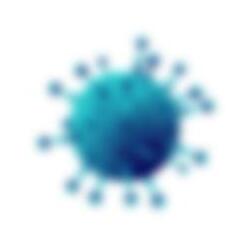


If you’re interested to learn more about the STARS program or would like to support training opportunities, please get in touch with Patrice Maher on 6319 1102, or email patrice.maher@telethonkids.org.au
“As an Aboriginal Researcher at Telethon Kids Institute, I look forward to the opportunities available to people like me who want to pursue research. It is an exciting thing to be a part of a program that leads to improving lives of kids and members in our community.”

Telethon Kids Institute moved swiftly to support the community, drive vital research and contribute to shaping health policies –including through modelling, advocacy, and well-received resources.



Ensuring we remained connected during such an unpredictable time meant we were able to educate, influence and provide insight from experts as soon as they were discovering it.
Modelling was key and the Telethon Kids Institute’s Geospatial Health and Development team – led by Telethon Kids and Curtin University Kerry M Stokes Chair of Child Health, Professor Peter Gething – created some of the most sophisticated modelling ever applied to an Australian outbreak.
Updated in real-time, the project led by Associate Professor Ewan Cameron created a new software tool to build a ‘virtual WA’ by using big data to map out the state’s unique physical and social geography, closely capturing the real interactions of our daily lives.
The model is still being updated daily and can be quickly adapted to any future outbreaks of the disease in WA.

16
17



The Wesfarmers Centre of Vaccines and Infectious Diseases at Telethon Kids Institute played a leading role in advising, assessing, and supporting the vaccine roll-out, and will help to shape what comes next.

The PICOBOO trial, led by Professor Peter Richmond and Dr Charlie McLeod from the Wesfarmers Centre, The University of Western Australia and Perth Children’s Hospital is an innovative, adaptive platform trial examining Australia’s COVID-19 booster program to determine which combination of vaccines give



the best protection, and who is likely to need an annual booster, like the influenza vaccine. The trial is also designed to be able include new vaccines as they come along particularly those that have been designed against the new Omicron variants of concern.



Since the beginning of the year, Telethon Kids Institute has delivered
3 COVID
Q and A forums
– free events for members of the public, corporate organisations, schools and even kids, to ask whatever question they like on COVID from a team of experts.
We hosted one in late January (just before borders opened), late March (when cases started to climb) and early June (when lots of people had experienced it and are now living with post-infection issues).
We plan to do more as the year goes on –stay tuned!
We also provided several online COVID briefings to our corporate partners including Wesfarmers and Rio Tinto, with hundreds of employees tuning in from offices and worksites across the state.
Our team of infectious disease experts, led by the Director of the Wesfarmers Centre of Vaccines and Infectious Diseases, Professor Chris Blyth, developed a suite of accessible resources to help parents, carers, teachers and the community navigate the outbreak.
A

series of
COVID fact sheets
were created by Director of the Wesfarmers Centre of Vaccines and Infectious Diseases, Professor Chris Blyth and Honorary Research Associate and Paediatrician Sam Brophy-Williams which were widely shared within the community by schools, GPs and other doctors.






The Institute advocated for schools to remain open during the outbreak, based on robust evidence that the best place for children to learn is at school.
Behind the scenes, our researchers sit on advisory boards including the Australian Technical Advisory Group on Immunisation (ATAGI), the WA Vaccine Safety Advisory Committee and National COVID-19 Health and Research Advisory Committee (NCHRAC) to drive policy decisions and provide accurate and helpful public information.

Telethon Kids Institute Executive Director and infectious disease expert, Professor Jonathan Carapetis, says medical research will continue to help pave the road we tread, as we continue to live through this generation-defining pandemic.
“It’s the medical research sector that developed the vaccines that have saved countless lives all over the world, created new treatments for those who have the disease, provided the evidence to guide government policies and helped to inform our understanding of how it affects all of us,” he said.
“I’m extremely proud of the work Telethon Kids Institute has done already and will continue to do on COVID-19, making a real difference to West Australian families.”
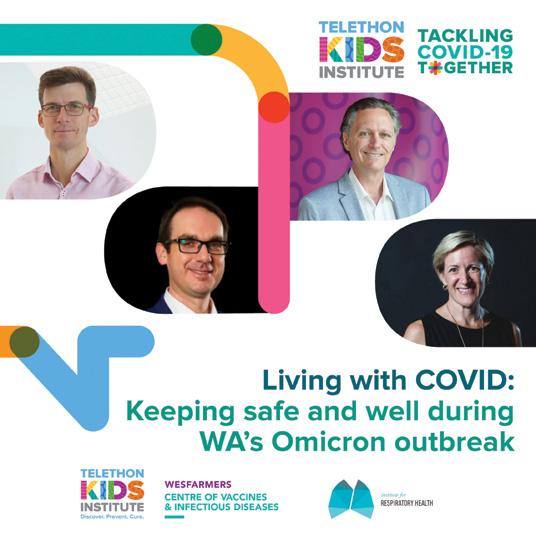


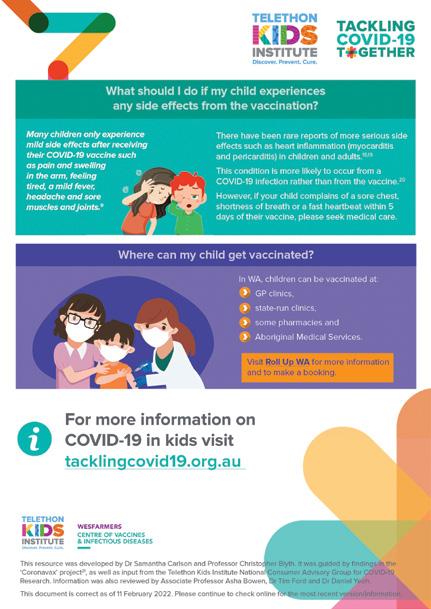
Professor Jonathan Carapetis
Our experts, led by Professor Carapetis, spent countless hours undertaking
media interviews
to answer questions, share advice and spread key public health messages.
With the Telethon Kids Institute name popping up over 2,500 times
across various media networks so far in 2022, you might have already read about some of our COVID research.
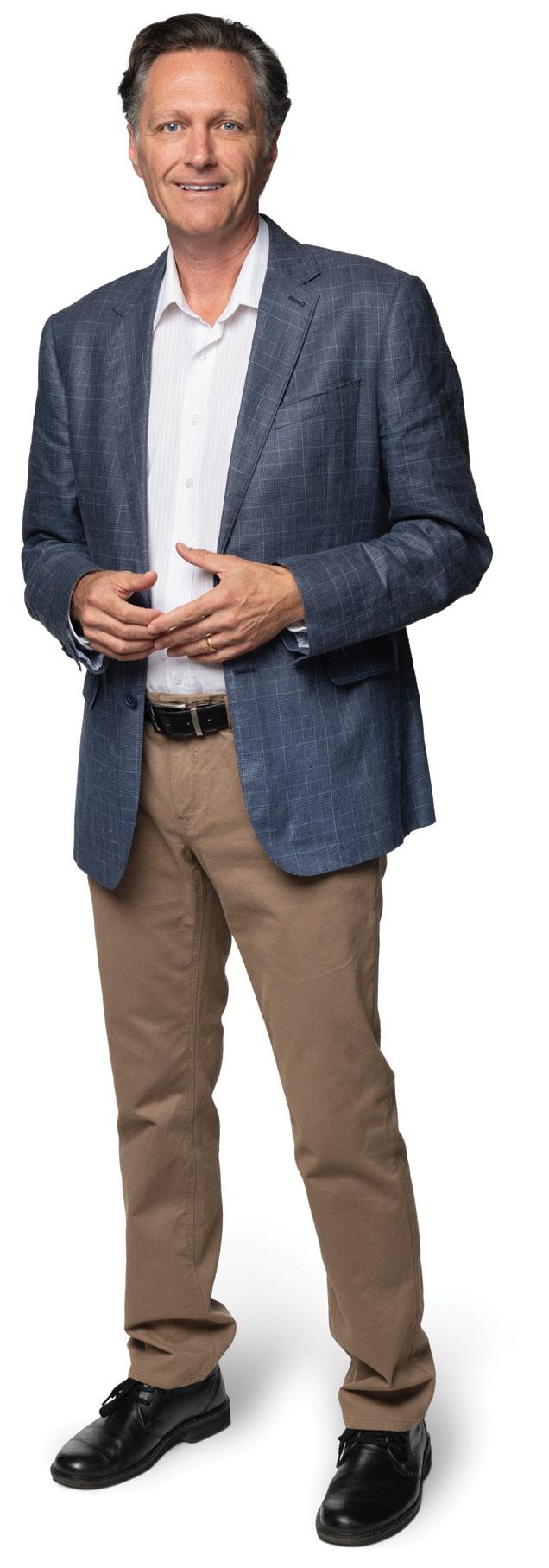
18 19
Shout Outs!
Queen’s Birthday Honours recipients
Our warmest congratulations to all our friends, partners and collaborators recently named in the Queen’s Birthday Honours list for their exceptional contributions and service to child health research.
A special mention to two recipients from our Telethon Kids Institute family, Professor Donna Cross and Catherine Hughes.

Professor Donna Cross was awarded the Medal of the Order of Australia (OAM) in recognition of her many years dedicated to improving youth mental health and wellbeing.
Cruisin’ for kids
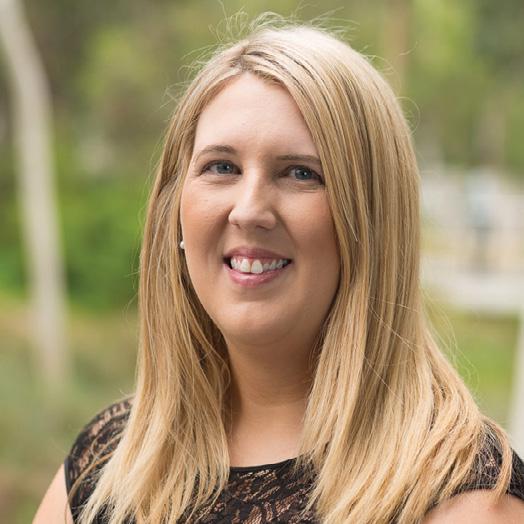
Catherine Hughes – Chair of the Wesfarmers Centre of Vaccine and Infectious Diseases Community Reference Group – became a Member of the Order of Australia (AM) for her significant service to immunisations, including her instrumental work in ensuring all pregnant mothers have access to whooping cough vaccines.
Damian Aram and his amazing support crew certainly know how to accelerate child health research – through an organised ‘Lights Out’ sunset car cruise. Choosing Telethon Kids as their charity of choice, car enthusiasts joined forces to support the Institute and organised a well-orchestrated, safe car cruise visiting various locations along the coast.
Starting at City West drivers cruised down to Fremantle, before heading back to South Trigg and finished with a well-deserved pit stop for celebrations at Hillarys Boat Harbour.
A night driven by generous support collecting gold coin donations for participating in the cruise, Damian’s event raised $268. Thanks to Damian and his pit crew for creating an innovative fundraising event.
Watch this space as Damian has grand plans for another event towards the end of this year!

Congratulations Nicole! 40Under40 Award
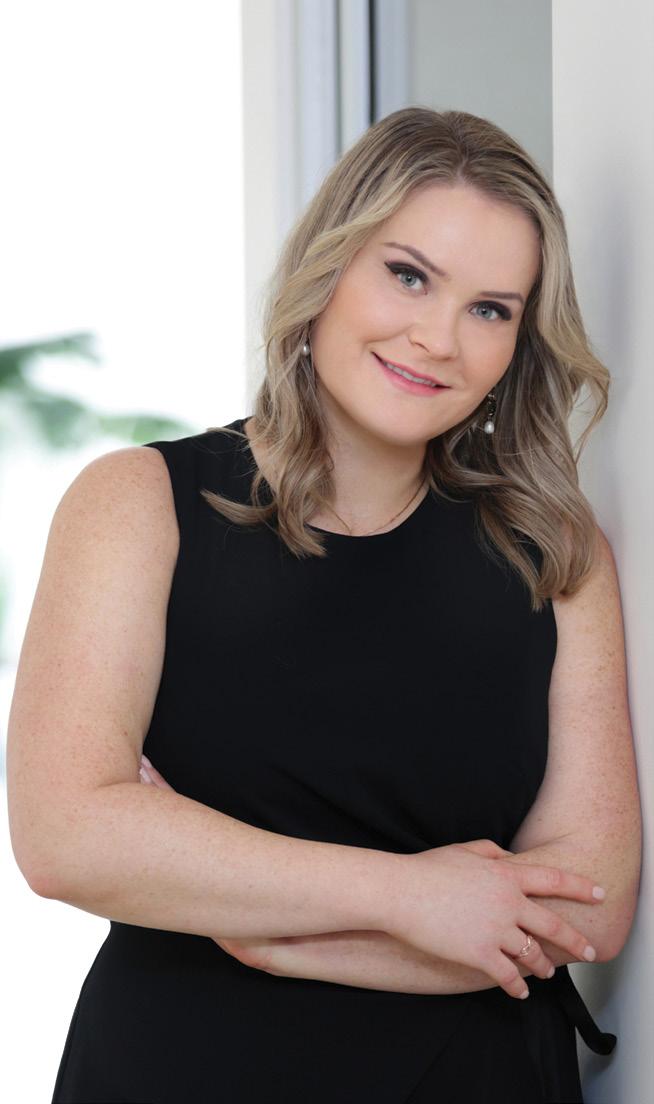
The annual 40Under40 Awards, run by Business News, are designed to acknowledge the future leaders of Western Australia, each year celebrating 40 outstanding young WA businessmen and women.
Telethon Kids Institute researcher Dr Nicole Hill, who is supported by the Forrest Foundation as a Forrest Research Foundation Prospect Fellow with the Youth Mental Health team at Telethon Kids, was named a 40Under40 winner in the Community, Social Enterprise, or Not-for-Profit category.
Dr Hill – recognised as a national leader in research in youth suicide prevention– is passionate about preventing self-harm and suicide in young people, and about improving equal access to mental health services among all Australians.
The importance of this work cannot be overstated. Congratulations Nicole!
Australian Academy of Science Accolade
Executive Director, Professor Jonathan Carapetis, was recently awarded the prestigious Fellowship to the Australian Academy of Science.
This is an outstanding achievement and recognises the incredible contribution Jonathan has made through his pioneering, paradigmshifting expertise in infectious diseases, as well as his leadership across organisations like Telethon Kids, the Menzies School of Health Research in Darwin, and the Association of Australian Medical Research Institutes (AAMRI).
With a career spanning more than 30 years, Jonathan has made worldfirst discoveries around Group A streptococcus (GAS), acute rheumatic fever (ARF) and rheumatic heart disease (RHD), which affect more than 40 million people and kill more than 500,000 people globally every year.
His work has reshaped control of RHD globally, particularly among Australia's First Nations people.
This Award means Jonathan Carapetis is now a member of two of Australia's most prestigious scientific academies after he was inducted as a Fellow of the Australian Academy of Health and Medical Sciences in 2014.
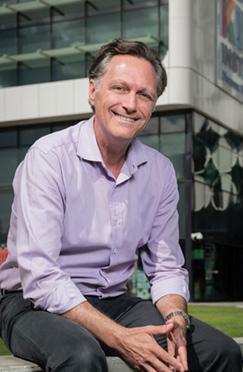
20 21 20
40 40
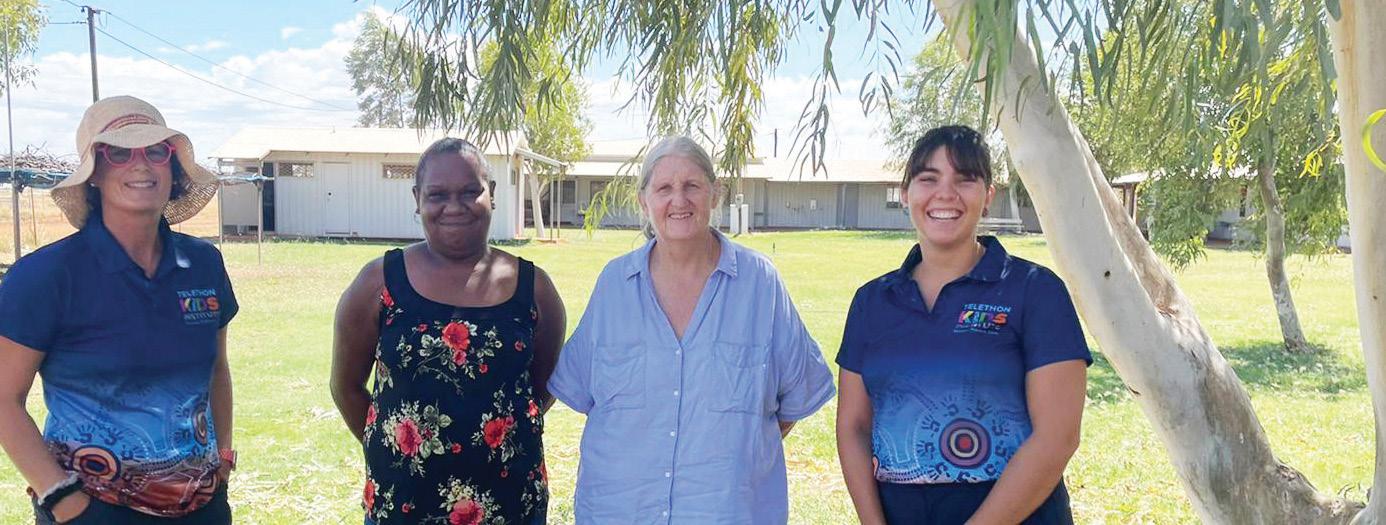
Healthy skin is important for maintaining overall physical and cultural health and wellbeing. Some skin infections, if untreated, can lead to serious downstream health complications such as heart disease, kidney disease, or sepsis.
SToP Trial is a large clinical trial currently underway in the Kimberley region of WA, which aims to decrease the burden of skin sores in remote-living school-aged Aboriginal children by 50 per cent. In an effort to improve the awareness, detection, and treatment of skin infections (in particular skin sores and scabies), the SToP Trial study is evaluating a package of activities aimed at Seeing (S), Treating (T) and Preventing (P) skin infections:
► Seeing
Implementing school-based screening surveillance activities to check kids’ skin for infections and refer them to their local clinic if they need treatment
Providing training for health workers, school staff and community members to improve detection of skin infections
Building the capacity of children, through interactive workshops, to recognise skin infections
► Treating
Making available in community clinics
streamlined evidence-based treatment for skin infections that are safe, effective, less invasive and easier for people to manage
Providing training for health workers to improve treatment of skin infections
► Preventing
Working with local communities to co-design and deliver community-driven skin-related health promotion and environmental health resources
The innovative trial is the first Australian healthy skin study to incorporate environmental health
Nine remote Kimberley communities

Kimberley 871 children consented to the trial 2,521 skin checks conducted to date, over the life of the trial
and health promotion elements. The trial is a collaboration between Telethon Kids Institute, Kimberley Aboriginal Medical Services, WA Country Health Services – Kimberley, and Nirrumbuk Environmental Health.
There are many projects embedded within the SToP Trial, which aim to deliver and evaluate health resources and outcomes in partnership with particular communities. These include the evaluation of electronic dashboard reporting to support the detection of skin sores, a health promotion video to promote the role of environmental health in supporting healthy skin, and a number of community-driven storytelling health promotion resources, including digital and physical storybooks and flipcharts.
At the beginning of the year, the WA COVID-19 wave brought a fresh round of challenges, but the SToP Trial team worked with communities to problem-solve and do their best to continue supporting skin health.
This included consulting with schools and communities about how the team could provide skin checks through virtual platforms if travel to community was not possible.
Despite the pandemic, the team were thrilled to visit all nine communities throughout May and June, conducting another 285 skin checks! SToP Trial Post-Doctoral Research Officer, Hannah Thomas said pivoting to and developing new approaches to conduct research has opened new possibilities for sustainable and communityled ways to continue supporting healthy skin beyond the life of the Trial.
“Community members have also been engaged to begin translation of our co-designed healthy skin resources into local languages, which we look forward to launching in partnership with communities later this year.”
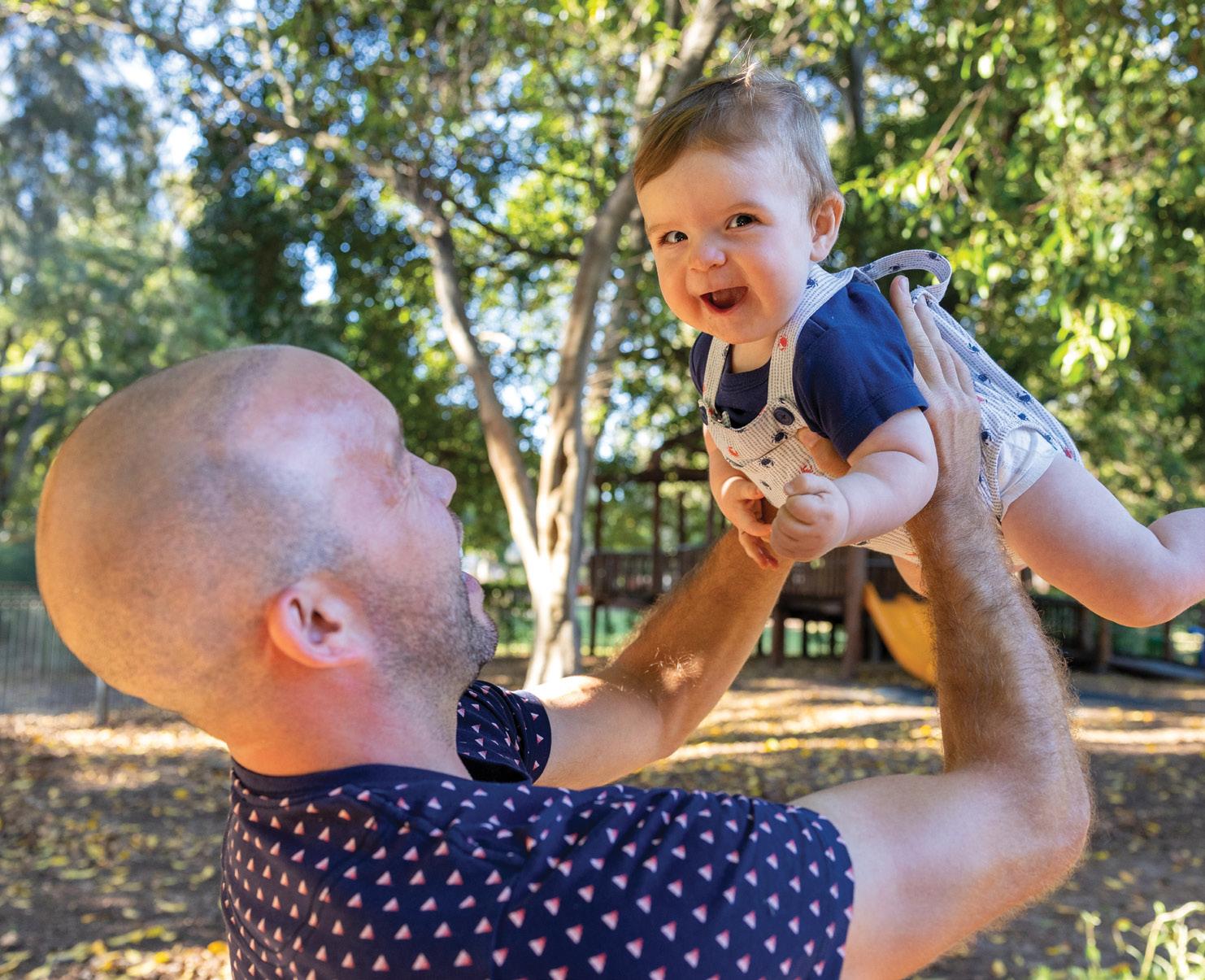
By including a gift in your Will to Telethon Kids Institute, you can be part of making the future better for generations of children to come.

Every donor and every dollar makes a difference
You are so important to Telethon Kids Institute’s ability to help kids be kids. Your donations empower our researchers to ask big questions and relentlessly pursue the answers.
Every dollar counts. And it’s your generosity that helps us discover, prevent and cure childhood disease and disadvantage in our society; advocate on behalf of children’s health everywhere; and ensure families, health professionals, teachers, and communities have the evidence-based information they need to improve the lives of our kids. Right now.
Unconditional giving powers our research
Unconditional giving is something we do every day with our own kids. We love, we give, we dream – unconditionally – for our kids and their future. That’s what we do here at Telethon Kids. Every day. And your unconditional gift to us is an unconditional gift to all kids’ future.
We invite you to join our giving community
Every donation – whether it is unconditional or directed to an area of research close to your heart – moves us closer to new discoveries.
All our donors are kept updated with breaking news, recognised in the Institute’s Annual Report, and receive our Together magazine written just for supporters.
Donors giving $500 or more become part of our Hopscotch Community. As a Hopscotcher, you will be invited to go behind-the-scenes of the Institute with fascinating events featuring researchers and science leaders.
Want to learn more or join our giving community?
To make a gift, simply visit giving.telethonkids.org.au/donate. For more information about Hopscotch and our giving community, please visit Annual Giving on our website or contact Erin Hurson, Development Manager on 08 6319 1444 or erin.hurson@telethonkids.org.au 1 2 3 4 5 6 7 8 9 10
22
skin, 22
learn more?
Healthy
healthy lives Interested to
Telethon Kids Institute ABN 86 009 278 755
can create happy, healthy futures
Visit giving.telethonkids.org.au or contact giving@telethonkids.org.au
You
for children
5 West Kimberley 4 East
participating:
Northern Entrance, Perth Children’s Hospital, 15 Hospital Avenue, Nedlands WA 6009 PO Box 855, West Perth Western Australia 6872
T | 08 6319 1000
E | contact@telethonkids.org.au
W | telethonkids.org.au
PRINCIPAL PARTNER


 Professor Jonathan Carapetis AM Executive Director
Professor Jonathan Carapetis AM Executive Director

























 Natasha Morrison
Natasha Morrison
































